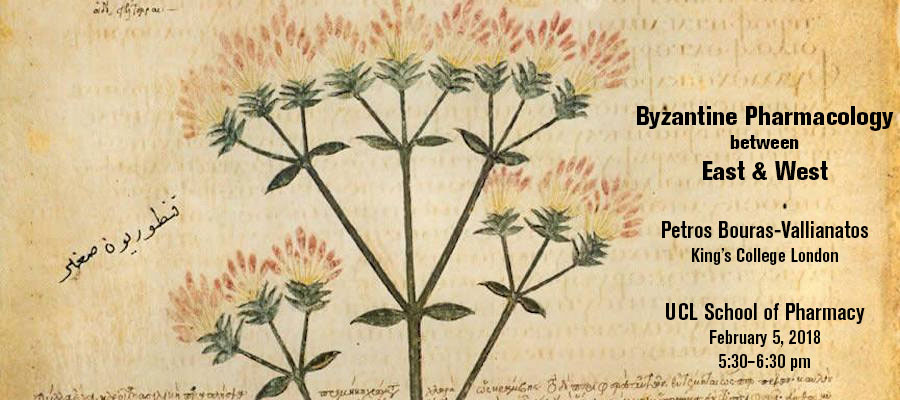Byzantine Pharmacology between East & West, lecture by Petros Bouras-Vallianatos (King’s College London), UCL School of Pharmacy, February 5, 2018, 5:30–6:30 pm
The Byzantine Empire, with its capital in Constantinople (now Istanbul), then a mainly Greek-speaking region, constituted a natural crossroads between East and West for more than a millennium (AD 324–1453). This lecture aims to determine the degree of influence on Byzantine pharmacology from Arabic, Persian, and Latin pharmacological traditions, and reassess the notion of the primacy of tradition over empiricism. Decisively overturning the view that Byzantine medical tradition was ‘stagnant’, simply preserving the best ideas from antiquity, and that Byzantine literature consisted of mere compilations, this paper aims to demonstrate that Byzantine pharmacology in particular was far more open to outside influence than has hitherto been thought and that Byzantine physicians were eager to inform their material with observations derived from their daily contact with patients.
Petros Bouras-Vallianatos is a Wellcome Trust Research Fellow in Medical Humanities at King’s College London. His Wellcome Trust funded project, ‘Experiment and Exchange: Byzantine Pharmacology between East and West (ca. 1150-ca.1450)’, aims to place in cultural and therapeutic context for the first time a large number of published and unpublished Byzantine pharmacological texts. It will determine the various connections between these treatises and evaluate the degree of influence on Byzantine pharmacology from Arabic, Persian, and Latin pharmacological traditions. It will also examine the activity of pharmacy-related professions and their role in the preparation, administration, and selling of drugs in Byzantium and will provide an important and fresh set of data for comparative historical studies across the Medieval Mediterranean and Near East.
